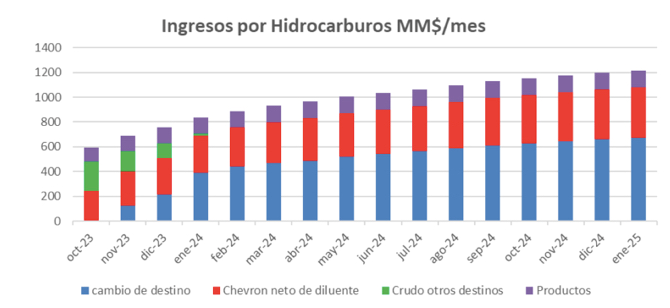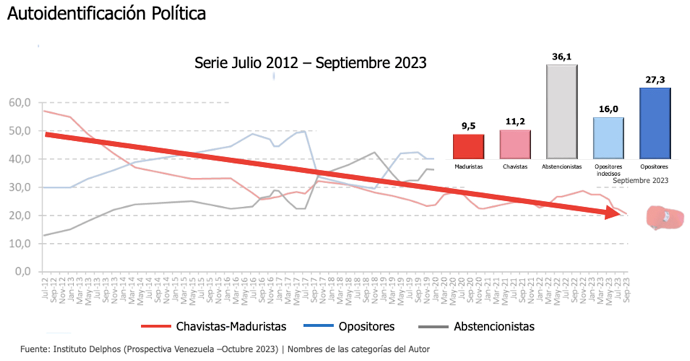





|
Tweet
|
|
|
“They bark, Sancho, it means we are riding”. - Don Quixote de la Mancha, Miguel de Cervantes, 1605
Jorge Rodríguez and Nicolás Maduro recognize that the agreement signed with the Biden administration, endorsed by the Democratic Unity Platform on October 17th in Barbados, is their primary avenue to retain power in Venezuela. They understand that it’s the only means to secure substantial revenues in the coming months through exports of oil, gas, and gold to markets in the United States, the European Union, and the Caribbean. These transactions are expected to bring in a monthly income ranging from $1 to $1.2 billion, according to estimates by Juan Szabo and Luis Pacheco in the hydrocarbon sector and projections from Transparency International and the consultancy Ecoanalítica concerning gold smuggling in 2022, which amounts to $1.7 billion. Additionally, there’s a potential $5.1 billion from the IMF, which has yet to be released due to disagreements over which Venezuelan faction should administer it. This influx of dollars would enable the criminal enterprise in Miraflores to portray an economic rebound for the country, creating a temporary sense of well-being. Thus, the U.S. Secretary of State, Antony Blinken, emphasized in a statement last week - amid the Israel-Hamas conflict - that this agreement facilitates “a significant step forward in addressing Venezuela’s tri-fold political, economic, and humanitarian crisis”. Yet, the Maduro regime must first establish by December a clear roadmap and detailed mechanism for all presidential contenders to run under fair electoral conditions, ensuring freedom of movement and personal security measures. It includes the immediate release of all unjustly detained Americans and Venezuelan political prisoners. In turn, the Biden administration displayed its commitment to the Barbados deal by issuing a six-month general license through the U.S. Treasury’s Office of Foreign Assets Control, authorizing transactions related to oil, gas, and gold in Venezuela post-agreement. Its renewal hinges on the fulfillment of commitments. The drama surrounding the primary elections on October 22nd, orchestrated by Maduro’s parliamentary president, the First Combatant, and the Electoral Chamber of the Supreme Court, aims to overshadow the remarkable day marked by the massive participation of over 2 million Venezuelans, leading to the undeniable victory of María Corina Machado. The primary shattered several tenets held by the staunchly “red” regime: the excellence of Venezuela’s fully automated electoral system, the use of the Republic Plan to ensure election safety, and the “dry law” - prohibiting alcohol sales and consumption nationwide - to maintain public order. Maduro’s track record of election tampering and repression means it’s unsurprising he might resist a peaceful, democratic resolution to the nation’s severe crisis. Accusations against him and his inner circle of crimes against humanity and narco-terrorism by international bodies only strengthen his reluctance to allow fair, free, and competitive elections with the Unit’s candidate elected on October 22nd. Still, Maduro must weigh the potential re-imposition of sanctions by major democratic nations. Retaining his illegitimate grip on the presidency in 2024 will continue to erode his political capital. The PSUV leader’s approval rating now stands at a mere 9.5%, per a Delphos, Prospectiva Venezuela survey from October 2023. His political capital has been plummeting since early this year. Suppose Maduro and his inner circle breach the October 17th agreement. In that case, it will provoke reactions not just from the U.S. administration but also from the European Union and the UN Secretary-General, who called for respecting political and electoral rights and sincerely implementing the Barbados agreement. Such a breach would further isolate Maduro, depriving him of essential currency to regain public approval and causing further attrition among the remaining Chavista supporters. It could plummet his political capital to 5% or 6% by April 2024, continuing the 1% monthly decline seen since January 2023. Consequently, all political players, Maduristas and Chavistas, would hold him responsible for Venezuela’s profound crisis. His negotiating position would weaken, marking him as the potential scapegoat for the Bolivarian revolution. The $20 billion at Maduro’s disposal in 2024, stemming from the Barbados deal, is his best chance to vie effectively in the presidential race. Reneging on his commitment jeopardizes his political capital and, consequently, his grip on power. In conclusion, the melodrama staged by “Jorgito and Cilita” concerning the primary election, directing the Supreme Court to “suspend reality”, is a distraction and manipulation tactic for the vast majority seeking political change in Venezuela. However, Maduro must tread carefully. Challenging the agreement could imperil his already precarious position and hasten his exit from Miraflores. |


